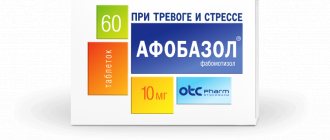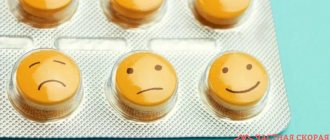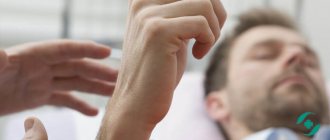Sleep disorder, restlessness, increased anxiety, irritability, emotional instability, high fatigue - familiar phrases for a modern person who often faces psycho-emotional stress and stress. When these and similar conditions affect the quality of life, the attending physician may prescribe Phenibut, a nootropic medicine that improves cognitive abilities and has a mild tranquilizing effect. This combination allows you to simultaneously maintain performance and eliminate anxiety.
Phenibut is good for people who often experience anxiety and restlessness.
What is this?
Phenibut is a drug that has anti-anxiety and nootropic effects. Widely used in the treatment of various neurological and mental disorders. Phenibut is well suited for simultaneous:
- eliminating anxiety;
- maintaining clarity of thoughts;
- effective ability for mental and physical work.
The drug Phenibut contains several components - the main active ingredient and additional ones. The main active ingredient of Phenibut is aminophenylbutyric acid, full name gamma-amino-beta-phenylbutyric acid.
The active substance is obtained from a combination of gamma-aminobutyric acid (GABA for short) and phenylethylamine.
Gamma-aminobutyric acid ensures metabolism and increases the efficiency of brain cells. It is classified as a nootropic substance, that is, a means that increases the efficiency of intellectual work, concentration and memory.
The second component of the drug, phenylethylamine, has the effect of a tranquilizer and an anti-anxiety agent. According to reviews, Phenibut reduces feelings of anxiety and attacks of fear, panic, enhances performance and normalizes sleep.
Together, GABA and phenylethylamine act as a nootropic activating agent with an anti-anxiety tranquilizer effect. It is this combination that increases the intellectual functioning of the brain under conditions of severe stress and the need to get rid of anxiety and other nervous conditions.
In addition to the main substance, the medicine contains auxiliary substances, such as lactose (milk sugar), potato starch, and calcium stearate. These substances enhance the properties of Phenibut, improve the effect on the body and prolong the effect of its use.
The question often arises: Is Phenibut an antidepressant or a tranquilizer?
As mentioned above, Phenibut simultaneously has a psychostimulating and tranquilizing effect, and in addition it also has an antioxidant and antiplatelet effect. The medicine is often used as an antidepressant because it increases the level of dopamine, the “happy hormone.” In addition, it has a mild tranquilizer effect. You can buy Phenibut without a prescription.
Phenibut quickly and effectively removes feelings of tension, emotional abnormalities and neuroses. Most doctors classify Phenibut as a nootropic drug with an anti-anxiety effect. But in some cases it is used in treatment precisely as a tranquilizer.
The international nonproprietary name of the product is Phenibut or gamma-amino-beta-phenylbutirate hydrochloride, after the name of the main active ingredient.
Indications
Phenibut can be used once to prevent motion sickness and for the purpose of premedication for anesthesia.
The active ingredient of the drug, aminophenylbutyric acid, is a derivative of phenylethylamine and gamma-aminobutyric acid (GABA). Moreover, GABA is an organic compound, a brain metabolite, that is, a substance that is used by the structures of the central nervous system to ensure metabolism and maintain the effective functioning of brain cells.
Phenibut is prescribed by your doctor to treat the following conditions or diseases:
- asthenic state (lethargy, apathy, feeling of exhaustion, fatigue, etc.);
- anxiety-neurotic conditions;
- constant incessant anxiety for various reasons;
- feeling of fear;
- feeling of anxiety;
- insomnia, nighttime restlessness and nightmares in older people;
- obsessive-compulsive neurosis;
- psychopathy;
- with strong anxiety before surgery or any other invasive diagnostic procedure;
- Meniere's disease and other pathologies of the vestibular apparatus caused by injuries, vascular and other disorders;
- otogenic labyrinthitis;
- dizziness caused by dysfunction of the vestibular apparatus;
- prevention of motion sickness;
- stuttering in children;
- tics of various origins in children;
- enuresis in children;
- alcohol withdrawal syndrome (in combination with other drugs);
- preliminary state in alcoholism;
- to enhance the effect of antiparkinsonian drugs.
For what?
Phenibut is not prohibited. This is a medicine with a broad complex effect, it:
- helps reduce the level of internal tension;
- relaxes, increases motivation, improves mood, increases creativity;
- normalizes oxygen exchange and blood circulation in the vessels of the brain;
- increases the speed of passage of nerve impulses;
- Phenibut enhances the ability to conduct physical and mental activity, endurance;
- relieves headaches, dizziness, sleep disorders;
- normalizes muscle tone;
- speeds up metabolism.
Phenibut is prescribed as a sedative and anti-anxiety agent:
- for insomnia at night to improve sleep;
- with nightmares;
- with asthenia (apathy, lethargy, feeling of exhaustion and powerlessness);
- with vegetative-vascular dystonia (VSD);
- various neuroses and depression;
- for children to combat hyperactivity;
- for stuttering, tics, speech disorders, enuresis in children.
Some patients write that they use Phenibut for weight loss. This effect is explained by the fact that the product increases the level of growth hormone, speeds up metabolism and removes toxins from the body.
Phenibut is used to improve the well-being of athletes; it is prescribed in bodybuilding and sports as a restorative agent for:
- reducing fatigue and tension;
- muscle recovery after training, relaxation and normalization of muscle tone;
- increased muscle activity;
- removing toxins from the body;
- stimulation and support of the production of hormones that affect the building of muscle mass;
- Phenibut helps normalize sleep and rest of the body;
- treatment of psychological disorders associated with stress in the body due to physical activity, to get rid of anxiety, normalize sleep;
- recovery from physical and psychological exhaustion of the body;
- increasing endurance.
Action
Let's look at the mechanism of action of the drug Phenibut.
When Phenibut enters the body, it first affects the functioning of nerve impulses and improves the activity of nerve cells. Phenibut normalizes tissue metabolism, increases the rate of blood circulation in the brain, dilates blood vessels, from large to small, which increases oxygen saturation of cells and prevents blockage of arteries with blood clots, reduces the tone of brain vessels, and improves blood circulation. This improves the functioning of the brain, leads to stimulation of thinking, memory, and attention. Phenibut neutralizes the effects of free radicals.
The active substance enters the body, dissolves in gastric juice and enters the blood. The effects of Phenibut after administration on average begin to act and appear within an hour. Due to individual characteristics, the onset of action of Phenibut may vary - it may be slightly shorter or longer.
After 3 hours from the moment of entry into the body, the concentration of the drug in the blood becomes maximum. And it begins to weaken due to gradual elimination from the body. The effectiveness of the drug taken lasts 6-8 hours. After this time, more than 50% of Phenibut is excreted from the body. To maintain the medicinal properties, repeat taking the medicine. Phenibut is completely eliminated from the body within 9-12 hours from the moment of administration.
In the case of a single dose, the effect is not always sufficient. To improve the functioning of the nervous system and brain function, it is necessary to take a course of Phenibut.
The greatest effect is usually observed after the fifth day of treatment with Phenibut. After stopping the course of taking Phenibut, the residual effect lasts up to two weeks.
The main active ingredient of Phenibut is non-toxic, has a minimum of side effects when used correctly, and does not cause allergic or carcinogenic effects.
Compatibility
Mexidol
Mexidol is an antioxidant drug that increases resistance to stress, improves blood circulation, normalizes metabolic processes in the body, with the active ingredient ethylmethylhydroxypyridine succinate. Not all patients can be treated with this drug due to contraindications to its use; the drug is poorly tolerated with high blood pressure and problems with the liver or kidneys.
The question often arises about whether it is possible to take medications together. From a pharmacological point of view, they are compatible. Both products have a calming effect, so they enhance each other's effect.
The combined use of the drugs Phenibut and Mexidol is possible only as prescribed by the attending physician, depending on the disease, characteristics of the body and contraindications. To avoid negative consequences, medications should be taken together only in accordance with the regimen specified in the instructions and doctor’s prescriptions regarding dosage, frequency of administration and time interval for use of the drugs. The dosage of each medication will be reduced. There is no need to separate medications from each other by time.
Coffee (caffeine)
Caffeine provokes increased activity, stimulates, increases cardiac activity, accelerates the pulse, dilates blood vessels, increases energy and improves mood. Caffeine is found not only in coffee, but also in other foods and drinks - tea, chocolate, and in painkillers.
Since Phenibut has a calming effect, it can be taken with coffee. While taking the product and caffeine, you must avoid other caffeine-containing drinks. This is due to the fact that caffeine has a stimulating effect. Large doses of caffeine can cause overexcitement, depletion of the central nervous system and a strong increase in blood pressure.
Glycine
Glycine is an aminoacetic acid (amino acid) that is a constituent of proteins. It has a rate-reducing effect on the central nervous system and has antioxidant and antitoxic properties. The product improves metabolism, with regular use, stress resistance increases, aggressiveness and conflict are reduced, emotional stress and anxiety are reduced, and sleep is normalized.
Phenibut and Glycine are similar analogues; both activate neurons in the cerebral cortex, have a positive effect on mental state, improve sleep, and relieve stress. They belong to different pharmacological groups and can be taken simultaneously, and the drugs will enhance each other's effects.
Phenibut increases the effectiveness of any psychoactive substance, and the amino acid reduces side effects. Therefore, they are often prescribed together. Since the effect of the amino acid is mild, dosage adjustment is not required.
However, in individual cases, when taken together, side effects may occur, such as drowsiness, weakness, and decreased concentration.
Corvalol
Corvalol is a drug with antispasmodic and sedative effects. Consists of peppermint oil, ethyl alcohol alpha-bromo-iso-valeric acid and phenobarbital. The drug relieves spasms, reduces anxiety, and dilates blood vessels. It is not recommended to take it for a long time due to the negative effects of its components.
Combined use with Phenibut can be prescribed for anxiety, various worries, panic attacks, for psychological disorders in the process of giving up alcohol, in the complex treatment of VSD.
The drugs are compatible, but their combination should be taken only according to the regimen prescribed by a qualified specialist. Phenibut repeatedly increases the effect of phenobarbital and ethyl alcohol, which are part of Corvalol.
Fluoxetine
Fluoxetine is an anti-depression drug, an antidepressant. The medicine increases the production of serotonin, improving mood. Prescribed for panic attacks, mental disorders, neuroses. The medicine has a wide range of side effects and is prescribed when psychotherapy does not bring results.
It is allowed to take simultaneously with Phenibut. Phenibut, due to its anxiolytic effect, enhances the effect of the antidepressant and eliminates its negative side reactions. When combining medications, you can easily cope with manifestations of panic and fear, dizziness and migraines, anxiety, and sleep disorders.
In case of joint use, the dosage of drugs is determined exclusively by a qualified specialist depending on the specific disease.
Pantogam
Pantogam is a nootropic that has a wide spectrum of action. The medicine reduces motor excitability, restores memory, stimulates mental and physical performance, reduces convulsive syndrome, and slightly reduces blood pressure. Prescribed for stuttering, mental retardation, cerebral vascular disorders, after traumatic brain injury, epilepsy. The active ingredient is hopantenic acid.
The drug is compatible with Phenibut. Both drugs have a different mechanism of action, but belong to the same group of nootropic drugs, increase brain efficiency, intelligence and performance, improve attention and memory. When used together, the effect is enhanced.
Prescribed together when, against the background of brain diseases, insomnia appears, excitability, irritability, and fears increase. The decision on simultaneous use is made by the attending physician; they must be taken strictly according to the prescribed plan.
Amitriptyline
Amitriptyline is an antidepressant. The drug has a sedative and hypnotic effect, reduces pain. It has a wide range of contraindications.
In some cases, it can be taken with Phenibut. Prescribed simultaneously for increased anxiety, severe and prolonged depression, insomnia associated with mental disorders. Medicines belong to different drug groups and differ in their mechanism of action. But when combined, they enhance each other’s effect. Phenibut reduces the side effects of amitriptyline, for example, it reduces the degree of aggression, nightmares, disturbances in memory and motor coordination, and the risk of epileptic attacks.
At the same time, it can be taken only in certain cases and strictly as prescribed by a specialist, depending on the patient’s condition, taking into account contraindications. In this case, the dosage of medications must be reduced to avoid such negative consequences as excessive hypnotic effects and lethargy.
Teraligen
Teraligen is an antipsychotic drug primarily used as a sedative and anti-anxiety agent. Prescribed in cases of anxiety, anxiety, neurosis, tendency to hysteria, depression and phobias, insomnia. It has a significant number of contraindications and possible side effects.
Together with Phenibut, you can take it only on the recommendation and under the supervision of a doctor, according to the doses and regimen of use adjusted by a specialist. Medicines reinforce each other. Together they can be prescribed to eliminate anxiety, neuroses, improve sleep, eliminate spasms, and improve brain activity. If you do not follow the recommendations of a medical specialist for joint use, there is a possibility of overexcitation, or, conversely, severe depression of the nervous system.
Magnesium B6
Magnesium B6 is a medicine that replenishes magnesium deficiency. Consists of two components: magnesium and vitamin B6. It is drunk when there is a lack of magnesium, which appears due to an unbalanced diet, during pregnancy, increased mental and physical stress and stress. The substance stimulates the production of blood cells, regulates phosphorus metabolism, maintains cholesterol levels, and relieves vascular spasms. The vitamin increases the absorption of the main substance, normalizes the functioning of the nervous system and improves heart function.
Can be taken together with Phenibut. The dosage and regimen are prescribed by a qualified specialist - the attending doctor, since when determining the doses of drugs, you need to focus on the characteristics of the condition.
Picamilon
Picamilon is a nootropic drug. It is prescribed for insomnia, neuroses, depression, instability in the emotional sphere, vegetative-vascular dystonia, and for the treatment of cognitive diseases. The active substance is nicotinoyl gamma-aminobutyric acid and the additional one is nicotinic acid (vitamin B).
The drug is compatible with Phenibut. Both drugs are based on aminobutyric acid, but in different chemical forms. Both are used to treat similar disorders. When used simultaneously, they increase each other's effect.
The possibility of taking two medications together, the dosage and administration plan are determined by the attending physician. Doses in this case are reduced due to a similar therapeutic effect. In some cases, compatibility of funds is undesirable.
Narcotic properties of the drug
The described medicine in large dosages or with long-term use can have a psychostimulating effect - under its influence, euphoria (a feeling of boundless joy) appears, which is why people become “addicted” to it. A friend can turn into an enemy - this is the answer to the question why this drug is banned in the USA, Australia and European countries. Meanwhile, people who want to get high on drugs at any cost find ways to get their hands on the “potion.”
Is Phenibut a drug? For many who took it for medicinal purposes, it is addictive, so there is a risk of drug addiction in any case. This phenomenon is due to the fact that when it enters the body, it stops producing compounds responsible for the transmission of nerve impulses through neurons, but continues to need them. Dependence develops; with abstinence, abstinence (withdrawal syndrome) occurs very quickly. Patients who have never thought about getting high may eventually become phenibut addicts.
The described drug is usually taken with other “happy” and intoxicating substances, as it enhances their effect:
- amphetamines cause euphoria more quickly;
- marijuana and butyrate provoke fewer negative reactions.
The use of such mixtures is fraught with overdose - even death. It should also be remembered that when combining phenibut with other drugs, the withdrawal syndrome increases significantly.
Instructions for use
Before you start using Phenibut, you need to study the instructions for its use and agree on the dosage and dosage plan with your doctor.
The most common recommendation is to take Phenibut in courses of 2-4 weeks; depending on the symptoms, the course of treatment is extended to 4-6 weeks. The duration of treatment according to the time of admission for each patient is determined by a qualified medical specialist based on symptoms and individual characteristics. May vary depending on changes in the patient's condition, the presence of contraindications or side effects. Between courses of Phenibut you need to take at least two weeks.
The annotation for Phenibut states that the average dose per dose for patients over 14 years of age is in the range of 250-500 mg, sometimes up to 750 mg. It must be remembered that for each patient the dose size and frequency of taking Phenibut per day may vary individually.
To maintain the therapeutic effect, it is necessary to take the medication every 6-8 hours. The instructions indicate that Phenibut should be taken 3 times a day.
Many people are interested in the question: when to take Phenibut - before or after meals?
The medicine should be taken after meals to reduce the possibility of negative effects of the drug on the stomach and intestines. The tablet should be swallowed completely, without crushing or chewing it, with plenty of water (approximately 200-250 ml).
If one or more doses of Phenibut are missed, then you should simply continue the course according to the prescribed regimen. It is not recommended to take a double dose the next time you take it.
If there are no contraindications or other doctor’s recommendations for changing dosages, Phenibut is usually prescribed in usual doses:
- Adult patients with depression, neuroses and other similar disorders are usually prescribed 500 mg of Phenibut three times a day. If indicated, the dosage is increased to 750 mg.
- To restore normal sleep for insomnia, 250 mg twice a day is often prescribed.
- In accordance with the annotation, in order to eliminate dizziness, you need to take 250 mg of Phenibut three times a day.
- In cases of heavy mental stress, it is often recommended to drink 250 mg of medication per day.
- To prevent motion sickness, it is recommended to drink 250-500 mg of Phenibut at the first symptoms or 1 hour before getting into the place of expected motion sickness.
If Phenibut is prescribed to children, it is recommended to adhere to the following dosage sizes:
- children under 8 years of age - ranging from 20 to 150 mg three times daily;
- at the age of 8 to 14 years - the dose should not exceed 250 mg, the number of doses - 3 per day;
- Children over 14 years of age are prescribed doses similar to the dosages of Phenibut for an adult.
The medication is prescribed to children because it has low toxicity, is gentle, and has virtually no side effects.
When using Phenibut, you need to pay attention to contraindications for use. The medicine should not be taken if you are sensitive to the substances of the drug.
Under the supervision of a specialist, drink Phenibut with caution:
- during pregnancy and lactation (breastfeeding);
- under the age of 3 years;
- with liver failure;
- for erosions and ulcers of the intestines and stomach.
Do not mix Phenibut with alcohol to avoid negative consequences. Alcohol, when mixed with Phenibut, is quickly absorbed and excreted slowly. When mixed, the effect of stimulating GABA receptors is greatly increased, which can be dangerous for the body.
During the course of taking the medication, it is recommended not to engage in activities that require concentration, and not to drive various mechanisms or vehicles. This is especially true at the beginning of the course, since a drowsy state is possible, so taking Phenibut and driving is dangerous. If you abruptly stop taking the drug, withdrawal syndrome may develop, so drivers should make sure that any effect of the drug has already worn off.
Literature:
- Pharmacology and clinic of phenibut / L. S. Mehilane, L. K. Ryago, L. H. Allikmets; Tart. univ. – Tartu: TU, 1990. – 147 p.
- Medicines in the neurological clinic: handbook. for doctors / E. I. Gusev, A. S. Nikiforov, A. B. Gekht. – 2nd ed., erased. – Moscow: MEDpress-inform, 2006 (M.: Printing house “News”). – 405 p.
- Pharmacodynamic and pharmacokinetic properties of drugs, GABA derivatives, developed at Volgograd State Medical University / Velikopolskaya M.V., Nikitina A.M., Suchkov E.A., Smirnova L.A. / 2016 / Volgograd scientific and medical journal
Side effects
Typically, Phenibut is well tolerated by patients without any unwanted effects. Sometimes side effects may occur: drowsiness or nausea at the beginning of treatment. Possible headache or dizziness, increased excitability, allergies.
The medicine Phenibut is quite safe if all doctor’s instructions regarding doses and dosage regimen are followed. In case of overdose or violation of the prescribed dosage plan, the severity of side effects increases.
If the dosage is exceeded, you need to rinse your stomach, take activated charcoal and medications to alleviate the symptoms.
If Phenibut doses are exceeded for a long time, liver dysfunction or sudden changes in blood pressure may occur.
Changes in pressure due to Phenibut occur due to the treatment process in the body, but they are insignificant. Patients with low or high blood pressure, before taking Phenibut, need to normalize their blood pressure by taking the necessary medications. Frequent significant changes in blood pressure levels occur when the Phenibut intake regimen is violated. If you adhere to the regimen recommended by the doctor, do not violate the dosage or frequency of use, then the drug does not negatively affect blood pressure.
The drug is processed and broken down in the liver, which increases the load on it. Therefore, in case of prolonged use of Phenibut, it is necessary to monitor liver function indicators. With long-term use in high doses, liver dysfunction may occur, often due to existing diseases. Phenibut should be taken with caution, under medical supervision, if the patient already has liver dysfunction. If signs of liver failure appear, the drug is discontinued.
Long-term use of Phenibut is not recommended. If you drink the product for more than 2-3 months, addiction may form. Especially in case of exceeding doses, when used simultaneously with other psychoactive substances or alcohol.
The body gets used to the effects of the medicine, and a slight dependence occurs. To avoid any kind of dependence on the drug Phenibut, you need to drink it exactly as prescribed by the doctor and reduce the dose at the end of the course.
Psychological dependence occurs due to a feeling of relaxation, proper rest during sleep, increased mental and emotional activity, and improved mood. Physical pain with long-term use occurs due to a decrease in the sensitivity of nerve cell receptors.
To avoid any kind of dependence on the drug Phenibut, you need to drink it exactly as prescribed by the doctor.
Abrupt withdrawal from Phenibut is strictly prohibited. Since during the course of treatment the body is rebuilt and reduces the independent production of nervous system mediators, this is what I received from the work of the medication. And to return to the previous mode of operation, the body needs time. Upon completion of treatment, especially abrupt withdrawal, the symptoms of the disorder return, and often in a more pronounced form.
At the same time, the threshold of sensitivity to the components of Phenibut is reduced, and repeated treatment will be more difficult and will require a longer time. Therefore, it is so important to observe the duration, dosage, and frequency of taking pills.
The Phenibut course is completed only by gradually reducing the amount of the substance received, so that the body can wean itself off the intake of substances, adapt and return to its previous functioning. Most often, the dose is reduced by a quarter of a tablet each time.
If your health worsens, you should consult a doctor who will give recommendations to reduce withdrawal symptoms.
conclusions
Phenibut is an effective drug that combines sedative and nootropic effects with a wide range of indications for use. This is its advantage; it reduces neurotic disorders, but at the same time increases brain function and performance.
Many doctors prescribe Phenibut due to its effectiveness and speed of action, low toxicity, safety, and a small range of contraindications and side effects. Phenibut is used by athletes to improve their condition, and is used by astronauts. The drug is used to treat not only adults, but also children. It is important to follow the instructions for use to avoid unwanted effects.
In the modern world, people are constantly surrounded by stress in their daily lives. Many experience daily frustrations over trifles, nervous breakdowns, difficult life circumstances, family tragedies, and the development of anxiety. In order to cope with such conditions and at the same time remain capable of high intellectual activity and physical labor, it is recommended to take Phenibut.
Phenibut addiction
With prolonged, uncontrolled use of phenibut, mental and physical dependence may develop. This may require special treatment from a psychiatrist-narcologist and subsequent rehabilitation. As a rule, cases of dependence on phenibut were observed in persons dependent on psychoactive substances who had a long history of drug addiction and who switched from using the drug to phenibut. The development of primary dependence on phenibut only after long-term use is extremely rare.








